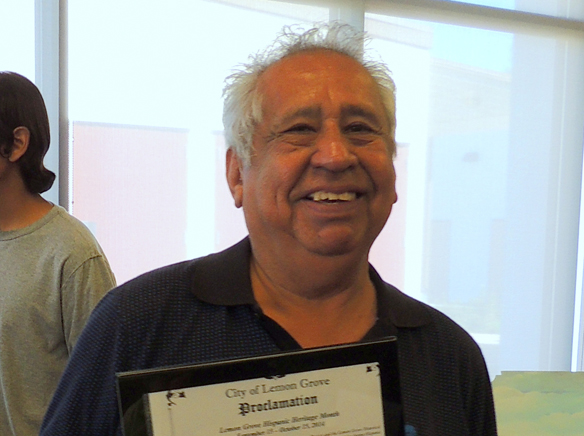The Hispanic heritage of Lemon Grove is the fabric of the town’s history. Without the Mexican-Americans who made their home here beginning in the early 20th century, Lemon Grove would not have the face it does today.
The Hispanic heritage of Lemon Grove is the fabric of the town’s history. Without the Mexican-Americans who made their home here beginning in the early 20th century, Lemon Grove would not have the face it does today.
That heritage was celebrated at the Lemon Grove Library last week with recognition of Sept. 16 as Lemon Grove Hispanic Heritage Day. The day, which marks the nation-wide Hispanic Heritage month, holds prominence for Lemon Grove because of the first de-segregation case in the nation was set against the Lemon Grove School Board. The citizens were decades ahead of their time in recognizing the importance of civil rights.
In January of 1931, Hispanic parents formed a committee and sought legal counsel through the Mexican Consulate in San Diego, protesting the separation of their children from the dominant white socio-economic class. The case was heard and the parents won in just three months. On March 11, 1931, Judge Claude Chambers ruled that California Hispanics were not to be excluded from schools as would blacks, native Americans and other minority groups.
At the celebration, a short film by Professor Johnny Valdez, founder of the Lemon Grove Oral History Project, featured some interviews of the students in that 1931 case.
Valdez’s cousin Maria Louisa Padilla was one of the people interviewed for the film. On film, she said, “You must be together to learn English better.”
Padilla was present at the celebration. “I’m very proud of this day, and of my cousin who helped put all this together. It takes a lot of work to do this,” she said.
Henry Gonzalez spoke about the video. “I was one of 10 sons, and nine of them served in the military,” said Gonzalez, whose sisters and brothers were in the 1931 case.
“All of us love this country,” Gonzalez said. “One of the biggest mistakes that the school board made back then is looking at us like we were different. But we were Americans. We were born here, we lived here, and we loved our country. I love this country still today as much or more than anyone else.”
Just as now, there were hate groups in 1931 that tried hard to stop the case from winning. But now Gonzalez’s children are going to college because of what his parents did, he said.
Gonzalez said that he thought it was ironic that 83 years after the case, the Mexican-American people can honor the occasion openly, but that his parents and neighbors did not openly celebrate the ruling in 1931. They were simply happy that their children could attend English-speaking school with the others, rather than in a separate barn-like building.
“Remember that this all happened 30 years before Cesar Chavez and Martin Luther King, Jr.,” Gonzalez said.
Dr. Robert Alvarez, who teaches at the Department of Anthropology at UCSD, echoed that quiet pride and sense of humility. Alvarez said that he did not even know about the “Lemon Grove Incident” as it was called in history books until recently before his research for his Ph.D. on immigration.
Alvarez ended up making the focus of his dissertation on his own family’s history. He kept hearing about the Lemon Grove School, and when finally he asked his father about it, he said that his mother had kept all the PTA minutes and news articles.
“I saw those minutes and articles and my jaw just dropped,” Alvarez said.
The one standout from the case, in Alvarez’s opinion, is how all the parents handled winning the case.
“My dad said that nobody wanted to go around bragging about it. That’s a real lesson in itself,” he said.
On a closing thought, Alvarez added some advice for young people.
“Don’t forget who you are. Stand up for your rights. But be humble about it when you win,” he said.
Musician Edgar Olivares ended the afternoon with “De Colores,” a popular Mexican-American song.
For more information about the Lemon Grove Incident of 1931, go to www.sandiegohistory.org/journal/86spring/lemongrove.htm.














![Lake Jennings Fishing Report 04.18.17 Fish Tales[1].jpg](https://eccalifornian.com/wp-content/uploads/2017/04/04.18.17-Fish-Tales1-100x70.jpg)